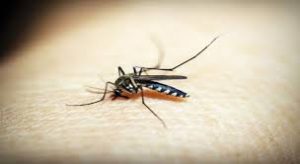Today’s Current Affairs: 23rd October 2025 for UPSC IAS exams, State PSC exams, SSC CGL, State SSC, RRB, Railways, Banking Exam & IBPS, etc
Table of Contents
MAM01 Monoclonal Antibody:

A novel monoclonal antibody named MAM01, developed by US researchers has demonstrated strong protection against malaria in an early clinical trial.
- MAM01 is a monoclonal antibody developed to prevent malaria infection.
- It’s designed to target a highly conserved region of the Plasmodium falciparum circumsporozoite protein, blocking infection before the parasite reaches the bloodstream.
- The trial found that MAM01 provided dose-dependent full protection against the malaria parasite with minimal side effects.
- Key Features of MAM01 Monoclonal Antibody
- Single injection of a long-acting antibody and provides immediate, months-long protection.
- It is particularly beneficial for young children and pregnant women in malaria-endemic regions.
Monoclonal antibodies:
- Monoclonal antibodies (mAbs) are laboratory-made proteins that mimic the body’s natural immune defenses.
- The word “monoclonal” refers to the fact that the antibodies created in the laboratory are clones. They are exact copies of one antibody.
- They are produced by cloning a single type of immune cell, known as a B cell, to generate large quantities of identical antibodies.
- This process creates highly specific antibodies that target a particular antigen, which could be a virus, bacteria, cancer cell, or other disease-related molecule.
- They can be designed to recognize and bind to a particular target molecule with great precision. This specificity reduces the risk of unintended side effects.
- They are used in a variety of medical applications, including the treatment of cancer, autoimmune diseases, and infectious disease.
Sinapic acid:

Nagaland University researchers have identified a naturally occurring plant compound called ‘Sinapic acid’ is capable of significantly accelerating wound healing in diabetic conditions.
- Sinapic acid is a natural phenolic acid compound, is a derivative of cinnamic acid.
- It has antioxidant, antitumor, anti-inflammatory, antibacterial and neuroprotective effects.
- It is extensively found in spices, citrus and berry fruits, vegetables, cereals, and oilseed crops
- The compound works by activating the SIRT1 pathway, which plays a crucial role in tissue repair, angiogenesis and inflammation control.
- The discovery marks a major advancement that could result in safe, natural, and effective treatments for diabetic wound management.
- A diabetic wound is a slow-healing sore, most often a foot ulcer. Also known as diabetic foot, it raises the risk of nerve damage (neuropathy), poor blood circulation, infections, and, in severe cases, amputation.
- Diabetes mellitus is a metabolic disease, involving inappropriately elevated blood glucose levels
- It remains one of the world’s most pressing chronic diseases, affecting hundreds of millions globally.
INS Vikrant: In News

The Prime Minister of India celebrated Deepavali aboard INS Vikrant and hailed armed forces’ unity in Operation Sindoor.
- It is India’s first indigenously designed and manufactured aircraft carrier.
- The ship has been designed in-house by the Indian Navy’s Warship Design Bureau and constructed by M/s Cochin Shipyard Limited.
- It was commissioned into the Indian Navy in 2022.
- Features of INS Vikrant
- With a length of 262 metres and a width of 62 metres, the massive aircraft carrier boasts 14 decks.
- Its full-load displacement is 43,000 tonnes.
- It is powered by four Gas Turbines totaling 88 MW of power and has a maximum speed of 28 knots.
- 8,600 miles (13,890 kilometres) and it is capable of functioning independently for up to 45 days at sea.
- It is capable of operating an air wing consisting of 30 aircraft comprising MIG-29K fighter jets, Kamov-31, MH-60R multi-role helicopters, in addition to indigenously manufactured Advanced Light Helicopters (ALH) and Light Combat Aircraft (LCA) (Navy).
- Using a novel aircraft-operation mode known as STOBAR (Short Take-Off but Arrested Landing), INS Vikrant is equipped with a ski- jump for launching aircraft and a set of ‘arrester wires’ for their recovery onboard.
Tetrataenium manilalianum : New Plant Species Discovered

Adding to the rich biodiversity of the Western Ghats, researchers recently discovered a new plant species named Tetrataenium manilalianum.
- Tetrataenium manilalianum is a new plant species belonging to the carrot family (Umbelliferae/Apiaceae).
- The plant was found in the Eravikulam National Park in Kerala’s Idukki district.
- The species has been named in honour of renowned botanical researcher and founder president of the Indian Association for Angiosperm Taxonomy, Prof. K.S. Manilal.
- It grows only in grasslands bordering shola forests in high-altitude regions.
- This is the 48th species identified within the carrot family, which includes well-known plants such as carrot, coriander, cumin, fennel, and ajwain.
- It is the first of its kind to be identified anywhere in the world.
- It has white flowers and underground rhizomes.
- It sprouts and flowers only during the monsoon
- Eravikulam National Park is situated along the summit of the Western Ghats in the high ranges of the Idduki District of Kerala.
Authorized Economic Operator (AEO) Programme:

The World Trade Organization (WTO) recently praised India’s liberalised Authorised Economic Operator (AEO) programme for significantly increasing the participation of micro, small, and medium enterprises (MSMEs) in international trade.
- AEO is a programme under the aegis of the World Customs Organisation (WCO) SAFE Framework of Standards to secure and facilitate Global Trade.
- The WCO in June, 2005, with a view to secure the international supply chain, adopted the SAFE Framework of Standards (WCO SAFE FoS).
- AEO is one of the three pillars on which the SAFE FoS is formed.
- AEO helps to build a closer partnership between the customs department and the trade industry.
- WCO SAFE FoS is the basis of the Indian AEO programme.
- AEO is a voluntary compliance programme which enables Indian Customs to enhance and streamline cargo security through close cooperation with the principal stakeholders of the international supply chain importers, exporters, logistics providers, custodians or terminal operators, custom brokers, and warehouse operators.
- Launched by the Central Board of Indirect Taxes and Customs (CBIC) as a pilot in 2011 and revised in 2016, the AEO programme merges India’s earlier accredited client programme.
- It is implemented by the Directorate of International Customs of CBIC.
- Under the AEO programme, an entity engaged in international trade is approved by Customs as compliant with supply chain security standards and granted AEO status & certain benefits.
- An AEO is a business entity involved in the international movement of goods requiring compliance with provisions of the national customs law.
- Once granted an AEO status, they are entitled to faster clearances, deferred duty payments, and reduced inspection frequency.
- Thus, an entity with an AEO status can be considered a reliable trading partner and a secure trader.
- This segmentation approach enables customs resources to focus on less noncompliant or risky businesses for control.
Skilling for AI Readiness (SOAR) Programme:

India is taking a major step toward building an AI-ready generation through the Skilling for AI Readiness (SOAR) programme.
- It was launched by the Ministry of Skill Development and Entrepreneurship (MSDE).
- It aims to integrate artificial intelligence learning into India’s school education and training ecosystem, preparing both students and teachers for a rapidly evolving digital world.
- SOAR’s long-term vision is to position India as a global leader in AI by preparing its youth for AI-driven careers and entrepreneurial ventures.
- It focuses on school students from class six to twelve and educators across India.
- It is offering three targeted 15-hour modules for students and a 45-hour module for teachers. These courses introduce foundational AI and machine learning concepts, along with data literacy and the ethical use of technology.
- In support of this vision, the Union Budget 2025–26 has earmarked ₹500 crore to establish a Centre of Excellence in Artificial Intelligence for Education.
- The centre will focus on developing AI-based learning tools, promoting multilingual AI resources for Indian languages, and fostering innovative classroom practices.
- It will also strengthen AI curriculum development across technical institutions and complement existing efforts by IITs and AICTE-approved colleges that already offer advanced courses in machine learning, deep learning, and data analytics.
Ningol Chakouba Festival:

Every year, the Department of Fisheries, Manipur, organises the Annual Fish Fair cum Fish Crop Competition on the day ahead of the Ningol Chakouba festival.
- The festival is celebrated every year on the second day of Hiyangei month of the Meitei calendar.
- Ningol means ‘married woman’ and Chakouba means ‘invitation for feast’; so the festival is the one where the married women are invited to their parents’ home for a feast.
- It dates back to the time when King Nongda Lairen Pakhangba ruled in Manipur.
- The Queen Laisana used to invite her brother Poireiton to the King’s palace for a feast once in a year. So, it was known as Piba (brother/son) Chakouba rather than Ningol Chakouba.
- The tradition changed during the time of King Chadrakirti Singh (1831-1886) in the 19th century. He invited his sisters for the feast as it was difficult for him to visit their places in one day.
- Thus, the tradition changed to Ningol Chakouba since then and continued to become an integral part of Manipur’s rich culture and heritage.
- The main component of the festival is the visit of married sisters to their maternal homes for grand feast and joyous reunion followed by giving away the gifts.
- It is customary for the son of the family to extend a formal invitation to his sister for Ningol Chakkouba a week before the gathering.
- The festival is held today outside Manipur where Manipuris are settled.
- The essence is to strengthen the bond of affection among the brothers and sisters, daughters and parents of a family.
Adani’s Godda Power Plant Approved for National Grid Connection:
The Government of India has approved the connection of Adani Power’s Godda Ultra Super Critical Thermal Plant to the national electricity grid. This 1,600 MW plant in Jharkhand, previously built to export electricity exclusively to Bangladesh, will now also supply power domestically — a decision expected to reshape the landscape of India’s cross-border power trade and grid strategy.Godda Power Plant is located in Godda district of Jharkhand, the Godda plant is a coal-based ultra supercritical thermal power station built by Adani Power Limited (APL). It was commissioned primarily to export power to Bangladesh under a long-term agreement.
Now, in 2025, this export-only status is changing.
UPI Introduces ‘Pay With Mutual Fund’ for Instant Transactions:
India’s Unified Payments Interface (UPI) has launched a new feature — ‘Pay with Mutual Fund’. This allows users to make real-time transactions directly from their liquid mutual fund holdings, eliminating the need to transfer funds to a bank account first. Backed by ICICI Prudential AMC, Bajaj Finserv AMC, and fintech startup Curie Money, the feature marks a global first in retail financial technology innovation.Pay with Mutual Fund’ is a revolutionary UPI feature that lets investors use their liquid mutual fund units like a digital wallet. When a UPI payment is made, the equivalent amount is automatically redeemed from the mutual fund, and the transaction is processed instantly. This effectively transforms mutual funds into payment-ready assets, bridging the divide between investment and everyday expense.
NPCI Launches AI-Based ‘UPI Help’ for Payment Query Support:
The National Payments Corporation of India (NPCI) has launched ‘UPI Help’, an AI-powered digital assistant aimed at simplifying grievance redressal and transaction tracking on the Unified Payments Interface (UPI). The new tool promises real-time support for millions of users facing common payment issues, such as failed or delayed transactions, unclear payment statuses, and autopay mandate queries. ‘UPI Help’ is a smart virtual assistant designed to streamline digital payment assistance. It functions as an automated support system capable of,
- Providing step-by-step resolution for failed or pending transactions
- Allowing users to check payment statuses instantly
- Enabling users to raise complaints and track their progress in real time
- Offering a unified view of all active mandates under the UPI Autopay feature
New Nomination Rules in Banking To Take Effect From November 1:
The Central Government has announced that updated nomination provisions under the Banking Laws (Amendment) Act, 2025 will come into effect from November 1, 2025. These provisions aim to simplify and streamline the nomination process for bank deposits, lockers, and articles in safe custody, ensuring faster and clearer settlement in the event of a depositor’s death. These new rules are part of broader reforms to improve governance, customer service, and depositor protection in India’s banking system.




